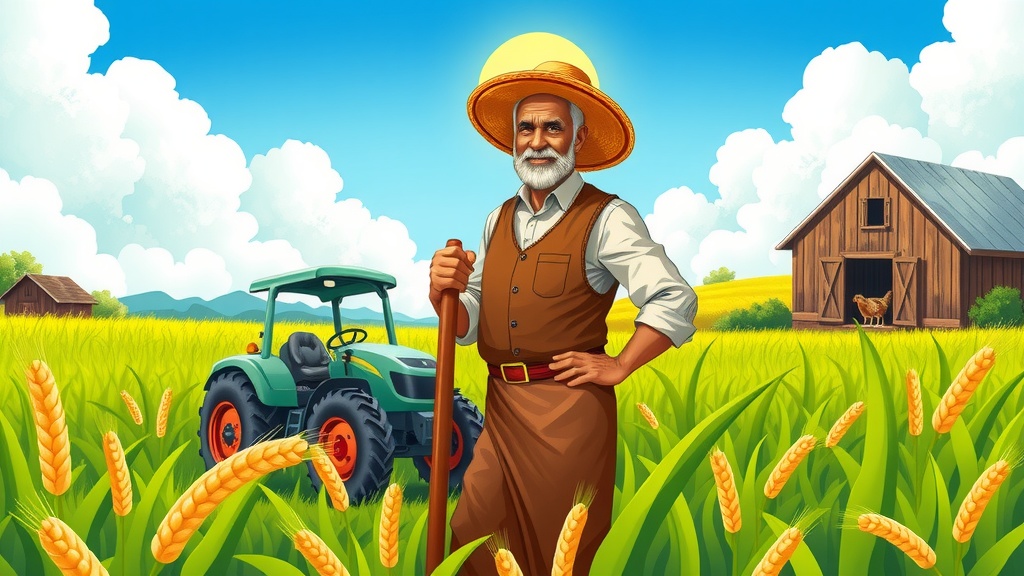In the heart of Bangladesh, where the green fields stretch as far as the eye can see, lives the farmer. He is the backbone of our nation, the unsung hero who toils tirelessly to feed us all. Have you ever wondered about the life of a farmer? Let's explore the world of these incredible individuals through a series of paragraphs, tailored for students from Class 6 to HSC, covering various word limits. Think of it as a journey into the fields, where we learn about their struggles, their contributions, and their unwavering spirit.
The Life of a Farmer: A Paragraph for Every Class
A Farmer Paragraph for Class 6 (150 Words)
A farmer is a very important person. He lives in a village and works hard in the fields. Farmers grow rice, vegetables, and fruits. They wake up early in the morning and work until late evening. They use simple tools like plows and sometimes machines like tractors. Farmers face many problems like floods and droughts. They depend on rain and sunshine for their crops to grow well. Without farmers, we would not have food to eat. We should respect farmers and appreciate their hard work. They are the real heroes of our country, feeding us every day with their dedication and perseverance. Imagine our plates empty without their effort—that's how vital they are!
A Farmer Paragraph for Class 8 (250 Words)
The life of a farmer in Bangladesh is one of relentless hard work and dedication. Farmers are the primary producers of food, cultivating crops like rice, jute, and vegetables. Their day begins before sunrise, as they prepare the land for planting, sow seeds, and tend to their fields. They use traditional methods, such as plowing with bullocks, and modern techniques, like using tractors and irrigation systems.
However, farmers face numerous challenges. Natural disasters like floods, cyclones, and droughts can destroy their crops, leading to significant financial losses. They also struggle with the rising costs of fertilizers and pesticides, making it difficult to sustain their livelihoods. Despite these hardships, farmers remain resilient, driven by the hope of a good harvest. They are the backbone of our economy, ensuring food security for the nation. It's crucial to support them with better resources, fair prices, and access to modern agricultural practices. Think of them as the roots of a tree, providing nourishment to the entire nation.
A Farmer Paragraph for Class 10, SSC (300 Words)
In Bangladesh, agriculture is not just an occupation; it's a way of life. Farmers, the heart and soul of this sector, dedicate their lives to cultivating the land and providing sustenance for the nation. From the fertile plains of the Ganges Delta to the terraced hills of Chittagong, farmers work tirelessly, facing numerous challenges with unwavering determination.
A typical day for a farmer involves long hours of physical labor. They plow the fields, sow seeds, irrigate the land, and apply fertilizers and pesticides. The work is often backbreaking, requiring immense strength and endurance. Moreover, farmers are constantly at the mercy of nature. Floods, droughts, cyclones, and other natural disasters can wipe out entire harvests, leaving them in dire straits.
Despite these hardships, farmers remain hopeful. They are deeply connected to the land and take pride in their work. They possess a wealth of traditional knowledge, passed down through generations, about soil management, crop rotation, and pest control. However, they also need access to modern technologies and sustainable farming practices to improve their yields and incomes. Supporting farmers through fair pricing, access to credit, and improved infrastructure is essential for ensuring food security and economic development in Bangladesh. They are the guardians of our food supply, deserving of our respect and support.
A Farmer Paragraph for Class 12, HSC (300 Words)
The agricultural landscape of Bangladesh is intricately woven with the lives of its farmers, the unsung heroes who form the backbone of the nation's economy. These individuals, often living in rural areas, dedicate their existence to cultivating crops, rearing livestock, and ensuring food security for millions. Their daily routines are characterized by relentless labor, traditional practices, and a deep-rooted connection to the land.
Farmers in Bangladesh face a myriad of challenges that test their resilience and adaptability. Climate change, with its erratic weather patterns, poses a significant threat to crop yields. Floods, droughts, and cyclones can devastate entire fields, leading to financial ruin for many farming families. Additionally, limited access to modern technology, inadequate irrigation facilities, and the rising costs of inputs like seeds, fertilizers, and pesticides further compound their difficulties.
However, despite these adversities, farmers continue to persevere, driven by a strong sense of duty and a deep-seated love for their profession. They possess invaluable traditional knowledge about farming practices, passed down through generations, which enables them to adapt to local conditions and manage resources effectively. To support these vital contributors to our society, it is imperative to invest in sustainable agricultural practices, improve infrastructure, provide access to affordable credit, and ensure fair prices for their produce. Only then can we secure a prosperous future for both our farmers and our nation.
Understanding the Farmer's World: Key Aspects
The Daily Life of a Farmer
Early Mornings and Late Evenings
Farmers typically wake up before sunrise, often as early as 5 AM, to begin their day's work. They continue working until late in the evening, sometimes even after sunset. This long workday is necessary to tend to their crops and livestock.
Physical Labor
Farming is physically demanding work. Farmers spend hours plowing fields, planting seeds, weeding, irrigating, and harvesting crops. These tasks require strength, stamina, and resilience.
Dependence on Nature
Farmers are heavily reliant on natural elements like rain, sunshine, and soil fertility. Weather patterns directly impact crop yields, making their livelihoods vulnerable to climate change and natural disasters.
Challenges Faced by Farmers
Natural Disasters
Bangladesh is prone to frequent natural disasters such as floods, cyclones, and droughts. These events can destroy crops, damage infrastructure, and cause significant financial losses for farmers.
Financial Constraints
Many farmers struggle with limited access to credit and financial resources. They often rely on informal lenders who charge high-interest rates, trapping them in a cycle of debt.
Market Access
Farmers often face challenges in accessing markets to sell their produce at fair prices. Middlemen and intermediaries can exploit them, reducing their profits.
The Importance of Farmers
Food Security
Farmers are essential for ensuring food security in Bangladesh. They produce the crops, vegetables, and fruits that feed the nation's population. Without their hard work, we would face widespread hunger and malnutrition.
Economic Contribution
Agriculture is a significant sector of the Bangladeshi economy. Farmers contribute to the GDP and provide employment opportunities in rural areas.
Cultural Significance
Farming is deeply ingrained in the cultural heritage of Bangladesh. It represents a way of life that has been passed down through generations, shaping the values and traditions of rural communities.
FAQs About Farmers in Bangladesh
What is the main occupation in Bangladesh?
The main occupation in Bangladesh is agriculture. A significant portion of the population, particularly in rural areas, is engaged in farming and related activities.
What are the main crops grown by farmers in Bangladesh?
Farmers in Bangladesh grow a variety of crops, including rice, jute, wheat, pulses, vegetables, and fruits. Rice is the staple crop, accounting for a large portion of agricultural production.
How do farmers contribute to the economy of Bangladesh?
Farmers contribute to the economy by producing food, generating income, and creating employment opportunities. Agriculture is a major sector of the economy, and its success depends on the hard work and dedication of farmers.
What are the challenges faced by farmers in Bangladesh?
Farmers in Bangladesh face numerous challenges, including natural disasters, financial constraints, limited access to technology, and market access issues.
How can we support farmers in Bangladesh?
We can support farmers by advocating for policies that promote sustainable agriculture, providing access to credit and financial resources, improving infrastructure, and ensuring fair prices for their produce.
Farmer Paragraph in Bangla Meaning
Understanding the life of a farmer becomes even more meaningful when we connect it to our native language. Here's a brief overview in Bangla to reinforce the essence of the farmer's role:
"একজন কৃষক আমাদের সমাজের জন্য খুবই গুরুত্বপূর্ণ। তারা গ্রামে বাস করে এবং মাঠে কঠোর পরিশ্রম করে। কৃষকরা ধান, সবজি ও ফল উৎপাদন করে। তারা খুব ভোরে ঘুম থেকে ওঠে এবং সন্ধ্যা পর্যন্ত কাজ করে। বন্যা ও খরা মতো অনেক সমস্যার সম্মুখীন হন। কৃষকেরাই আমাদের দেশের অর্থনীতির মেরুদণ্ড। তাদের ছাড়া আমরা খাবার পেতাম না।"
This translates to: "A farmer is very important for our society. They live in villages and work hard in the fields. Farmers produce rice, vegetables, and fruits. They wake up very early and work until evening. They face many problems like floods and droughts. Farmers are the backbone of our country's economy. Without them, we would not have food."
Farmer's Tools: A Closer Look
Farmers use a variety of tools, both traditional and modern, to carry out their agricultural activities. These tools play a crucial role in improving efficiency and productivity.
Traditional Tools
Plow (লাঙ্গল)
The plow is a traditional tool used for tilling the soil. It is typically pulled by bullocks or buffaloes and helps to prepare the land for planting.
Sickle (কাস্তে)
The sickle is a curved blade used for harvesting crops like rice and wheat. It is a simple yet effective tool for cutting stalks.
Hoe (কোদাল)
The hoe is a versatile tool used for weeding, digging, and cultivating the soil. It is essential for maintaining the health of crops.
Modern Tools
Tractor (ট্রাক্টর)
The tractor is a powerful machine used for plowing, planting, and harvesting crops. It significantly reduces the time and effort required for these tasks.
Irrigation Pump (সেচ পাম্প)
Irrigation pumps are used to supply water to crops, especially during dry seasons. They help to ensure a consistent water supply, leading to higher yields.
Sprayer (স্প্রেয়ার)
Sprayers are used to apply pesticides and fertilizers to crops. They help to protect crops from pests and diseases and improve their growth.
The Impact of Climate Change on Farmers
Climate change poses a significant threat to farmers in Bangladesh. Rising temperatures, erratic rainfall patterns, and increased frequency of natural disasters are impacting crop yields and livelihoods.
Rising Temperatures
Higher temperatures can reduce crop yields and increase water demand. This can lead to water scarcity and crop failure, especially in regions that are already water-stressed.
Erratic Rainfall
Unpredictable rainfall patterns can disrupt planting schedules and affect crop growth. Too much or too little rain can lead to floods or droughts, damaging crops and reducing yields.
Natural Disasters
Climate change is increasing the frequency and intensity of natural disasters such as cyclones and floods. These events can devastate agricultural lands and cause significant economic losses for farmers.
Mitigation and Adaptation Strategies
To mitigate the impact of climate change, farmers need to adopt sustainable agricultural practices such as crop diversification, water conservation, and integrated pest management. They also need access to climate-resilient crop varieties and technologies.
Crop Diversification
Growing a variety of crops can reduce the risk of crop failure and improve soil health. It can also provide farmers with a more stable income stream.
Water Conservation
Implementing water conservation techniques such as rainwater harvesting and drip irrigation can help to reduce water demand and improve water use efficiency.
Integrated Pest Management
Using integrated pest management strategies can help to reduce the use of chemical pesticides and protect the environment.
Empowering Farmers for a Sustainable Future
Empowering farmers is essential for ensuring food security and economic development in Bangladesh. This requires a multi-faceted approach that addresses their needs and challenges.
Access to Credit
Providing farmers with access to affordable credit can help them to invest in modern technologies, improve their farming practices, and increase their incomes.
Training and Education
Offering training and education programs can equip farmers with the knowledge and skills they need to adopt sustainable agricultural practices and improve their productivity.
Market Linkages
Establishing strong market linkages can help farmers to sell their produce at fair prices and reduce their dependence on middlemen and intermediaries.
Infrastructure Development
Investing in rural infrastructure such as roads, irrigation systems, and storage facilities can improve access to markets and reduce post-harvest losses.
Government Support
Providing farmers with subsidies, insurance, and other forms of government support can help them to cope with the risks and challenges of farming.
A Farmer's Resilience: Stories of Hope
Despite the numerous challenges they face, farmers in Bangladesh demonstrate remarkable resilience and determination. Their stories are filled with hope, perseverance, and a deep connection to the land.
The Story of Rahim Mia
Rahim Mia is a smallholder farmer from a remote village in Bangladesh. He has been farming for over 30 years and has faced numerous challenges, including floods, droughts, and cyclones. Despite these hardships, he has never given up on his farm. He has adopted sustainable agricultural practices and has diversified his crops to reduce his risk. Today, he is a successful farmer who is able to provide for his family and contribute to his community.
The Story of Amena Begum
Amena Begum is a woman farmer who has overcome many obstacles to achieve success. She comes from a poor family and had limited access to education and resources. However, she was determined to improve her life through farming. She joined a local women's group and received training in sustainable agricultural practices. She also received a loan to purchase seeds and fertilizers. Today, she is a successful farmer who is able to support her family and send her children to school.
The Story of Kamal Hossain
Kamal Hossain is a young farmer who is using technology to improve his farming practices. He has a smartphone and uses it to access information on weather forecasts, crop prices, and pest management. He also uses social media to connect with other farmers and share his experiences. He is a role model for other young people in his community and is helping to modernize agriculture in Bangladesh.
The Future of Farming in Bangladesh
The future of farming in Bangladesh depends on our ability to address the challenges faced by farmers and empower them to adopt sustainable agricultural practices. By investing in research and development, improving infrastructure, and providing access to credit and education, we can create a more resilient and prosperous agricultural sector.
Sustainable Agriculture
Promoting sustainable agricultural practices such as organic farming, conservation agriculture, and integrated pest management can help to protect the environment and improve the long-term productivity of farms.
Technology Adoption
Encouraging the adoption of modern technologies such as precision farming, drone technology, and mobile applications can help farmers to improve their efficiency and productivity.
Climate Resilience
Developing climate-resilient crop varieties and implementing climate adaptation strategies can help farmers to cope with the impacts of climate change.
Youth Engagement
Engaging young people in agriculture can help to ensure the sustainability of the sector and create new opportunities for economic growth.
In conclusion, the life of a farmer in Bangladesh is a testament to hard work, resilience, and dedication. They are the backbone of our nation, providing us with the food we need to survive. By understanding their challenges and supporting their efforts, we can ensure a brighter future for both our farmers and our country. So, the next time you enjoy a meal, remember the farmer who made it possible. Let's all strive to support them and appreciate their invaluable contribution to our society. What steps will you take to show your support for the farmers of Bangladesh?




